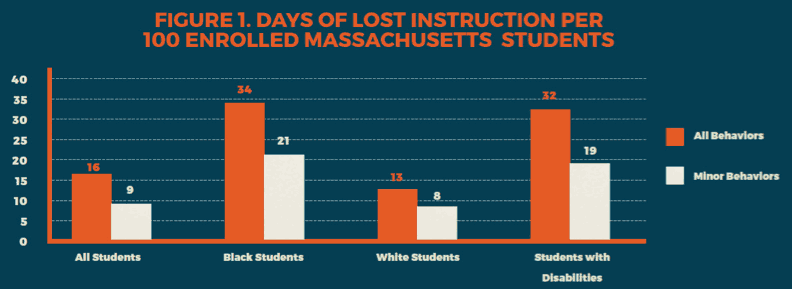Press Release
Massachusetts Students Miss an Alarming Amount of Instruction Days Because of Suspensions over Minor Misbehavior

New research from the Center for Civil Rights Remedies, a Schott Foundation grantee, shows that excessive discipline of African-American students and students with disabilities creates systemic inequities in educational opportunities.
FOR IMMEDIATE RELEASE
CONTACT: DeQuendre Neeley-Bertrand
646-561-8775
communications@schottfoundation.org
 CAMBRIDGE, Mass.—New research released today shows that the overuse of suspensions in the Commonwealth’s schools is harming educational opportunities for all students, but black students and students with disabilities carry a far greater burden than other groups and miss out on more instructional time. The report calls for the state to use lost instruction time due to discipline as an accountability measure, and advocates around the state are echoing the call.
CAMBRIDGE, Mass.—New research released today shows that the overuse of suspensions in the Commonwealth’s schools is harming educational opportunities for all students, but black students and students with disabilities carry a far greater burden than other groups and miss out on more instructional time. The report calls for the state to use lost instruction time due to discipline as an accountability measure, and advocates around the state are echoing the call.
Suspended Education in Massachusetts: Using Days of Lost Instruction to Evaluate Our Schools reports that the statewide average was 16 days of missed instruction for every 100 enrolled students during the 2015-16 school year. This number doubles to 32 days per 100 for students with disabilities. At 34 days per 100 students enrolled, black students missed nearly triple the 13 days missed by white students. When it comes to days missed due to minor misbehavior (offenses not involving violence, drugs or other criminal activity) white students lost eight days per 100 enrolled. Black students lost 21 days for minor misbehavior. Students with disabilities lost 19.
Missed instruction time can have a devastating impact on students’ academic achievement and suspensions are known to be closely related to graduation rates and involvement with juvenile justice. While schools don’t have control over every factor that causes students to miss instruction time, they can control who misses out on learning because of suspensions.
“We want to encourage state policymakers to adopt ‘days of missed instruction’ as either a standalone indicator or as part of a school climate or chronic absenteeism indicator for statewide accountability because it is an area that research has shown is determined by school-level policies, practices and leadership,” says Daniel J. Losen, Director of the Center for Civil Rights Remedies and the report’s lead author. “We are also very concerned about stark disparities for black students and students with disabilities. The findings suggest that excessive discipline creates serious inequities in educational opportunity.”

Suspended Education in Massachusetts is the first-ever independent analysis of the days of missed instruction that breaks down these issues to the school level. Most schools fell below the statewide average of 16 days per 100 students enrolled, but a troubling number of schools averaged more than 100 days missed per 100 students enrolled. This disparity reinforces how schools hold a great deal of influence over this issue.
Alternative schools and five charter schools in the state make up a disproportionate number of the schools with the most days of missed instruction. More than one of these schools came from the districts of Brockton, Fall River, New Bedford, Lowell, Fitchburg and Springfield. Three of the five charters (Up Academy of Boston and City on a Hill, at Dudley Square, and at Circuit Street) serve students from Boston.
“The data presented in this report brings a new level of detail to a distressing trend: rather than be provided with an equitable opportunity to learn, black and brown children and students living with disabilities are consistently over-penalized and pushed out,” says John H. Jackson, President and CEO of the Schott Foundation, which supported the release of the paper. “It’s also no secret that these disciplinary practices contribute to the school-to-prison pipeline so we join the chorus of calls to use better measures like days of lost instruction due to discipline to reveal the true extent and consequences of those policies and practices.”
The report also provides district-level analysis. District numbers tend to be much lower because the lower-suspending schools balance out the high-suspending ones. The report’s district-level analysis focused on where students with disabilities lost the most instructional time and on districts with at least two schools and 2,500 students. It found that Wareham topped this list with a district average of 110 days of missed instruction per 100 enrolled students with disabilities.
Numerous advocates around the state, including members of the Chapter 222 Coalition, are in support of incorporating exclusionary discipline into the state’s accountability system under the Every Student Succeeds Act by treating days of lost instruction due to discipline as an indicator of school quality. This report also precedes another soon-to-be released report by Schott partner the Massachusetts Budget and Policy Center, which explores alternative approaches to harsh school discipline practices and considers the resources needed to implement these practices in Massachusetts.
The Suspended Education report is released with a data supplement that enables readers to find the data on their school or district for all students, black students, and students with disabilities. The data also enables comparisons to other districts. The full report and data supplement can be downloaded from the Center for Civil Rights Remedies website, www.schooldisciplinedata.org, or https://schottfoundation.org/report/suspended-education-massachusetts.
Members of the public are encouraged to comment on the state’s set of proposed indicators by close of business on March 9th, and to request that “days of missed instruction due to discipline” be added as an indicator. The Massachusetts Department of Elementary and Secondary Education ESSA Winter/Spring 2017 Statewide Feedback survey is available at http://dese.essacomments.sgizmo.com/s3/ and additional comments can be sent to essa@doe.mass.edu. The deadline for public comment is today, March 9, 2017. For a full review please visit the state’s website.
 The UCLA Civil Rights Project’s Center for Civil Rights Remedies (CCRR) is dedicated to improving educational opportunities and outcomes for children who have been discriminated against historically due to their race or ethnicity and who are frequently subjected to exclusionary practices such as disciplinary removal, over-representation in special education and reduced access to a college-prep curriculum. CCRR has issued numerous reports about the use of disciplinary exclusion. CCRR is an initiative of the Civil Rights Project (CRP)/Proyecto Derechos Civiles, at UCLA. Founded in 1996 by former Harvard professors Gary Orfield and Christopher Edley, Jr. CRP is now co-directed by Orfield and Patricia Gándara, professors at UCLA. Its mission is to create a new generation of research in social science and law on the critical issues of civil rights and equal opportunity for racial and ethnic groups in the United States. It has monitored the success of American schools in equalizing opportunity and has been the authoritative source of segregation statistics. CRP has commissioned more than 400 studies, published more than 15 books and issued numerous reports from authors at universities and research centers across the country.
The UCLA Civil Rights Project’s Center for Civil Rights Remedies (CCRR) is dedicated to improving educational opportunities and outcomes for children who have been discriminated against historically due to their race or ethnicity and who are frequently subjected to exclusionary practices such as disciplinary removal, over-representation in special education and reduced access to a college-prep curriculum. CCRR has issued numerous reports about the use of disciplinary exclusion. CCRR is an initiative of the Civil Rights Project (CRP)/Proyecto Derechos Civiles, at UCLA. Founded in 1996 by former Harvard professors Gary Orfield and Christopher Edley, Jr. CRP is now co-directed by Orfield and Patricia Gándara, professors at UCLA. Its mission is to create a new generation of research in social science and law on the critical issues of civil rights and equal opportunity for racial and ethnic groups in the United States. It has monitored the success of American schools in equalizing opportunity and has been the authoritative source of segregation statistics. CRP has commissioned more than 400 studies, published more than 15 books and issued numerous reports from authors at universities and research centers across the country.
 The Schott Foundation for Public Education aims to develop and strengthen a broad-based and representative movement to achieve fully resourced, quality PreK-12 public education. Schott’s core belief is that well-resourced grassroots campaigns can lead to systemic change in the disparities poor children and children of color face in our nation’s schools. In helping to build these campaigns into a movement, Schott recognizes its pivotal role as both funder and advocate to ensure that all children have an opportunity to learn.
The Schott Foundation for Public Education aims to develop and strengthen a broad-based and representative movement to achieve fully resourced, quality PreK-12 public education. Schott’s core belief is that well-resourced grassroots campaigns can lead to systemic change in the disparities poor children and children of color face in our nation’s schools. In helping to build these campaigns into a movement, Schott recognizes its pivotal role as both funder and advocate to ensure that all children have an opportunity to learn.


